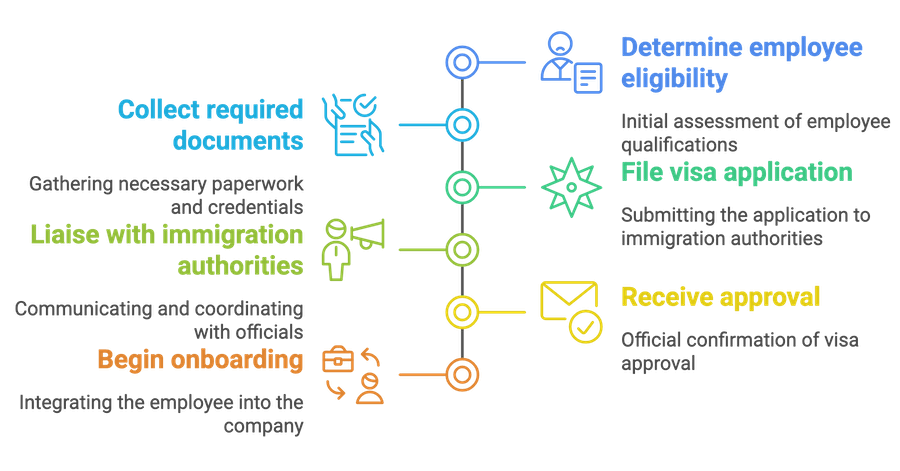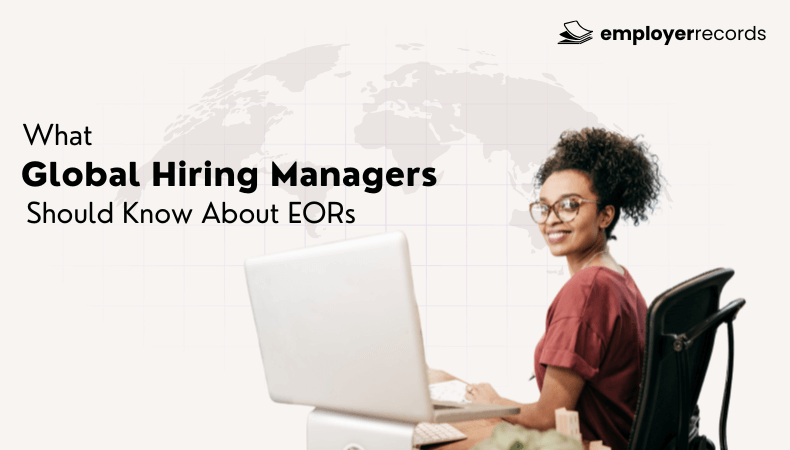Key Takeaways
- Yes, an EOR can sponsor work visas in many countries.
- Eligibility depends on local laws, EOR licensing, and visa type.
- EORs handle everything from application to onboarding.
- Limitations exist in countries like the U.S. (H-1B cap, sponsor licenses).
- Tip: Always verify EOR experience and legal presence before engagement.
Expanding a workforce across international borders comes with a complex array of legal, administrative, and regulatory challenges. One of the biggest hurdles? Navigating work visa requirements and staying compliant with local labor laws.
If you don’t have a legal entity in the country where you want to hire, things can get even trickier. That’s where Employers of Record (EORs) step in to simplify things.
EORs take on the role of the official employer for your international hires. They handle payroll, benefits, HR compliance, and most importantly in this context, work visa sponsorship.
So, can an EOR actually sponsor a work visa? Yes, in many cases. This article breaks down how EORs handle visa sponsorship, the benefits and limits of going this route, and what companies need to consider before taking the leap.
What Is an Employer of Record (EOR) and How Does It Work?
An Employer of Record (EOR) is a third-party organization that legally employs workers on behalf of a client company. Under this arrangement, the EOR becomes the “official” employer in the eyes of local authorities (tax agencies, social security institutions, labor departments, etc.), while the client company retains control over day-to-day job responsibilities, performance evaluations, and work assignments.
Here’s what an EOR typically takes care of:
- Payroll and Taxes: They calculate wages, withhold the right taxes, and pay employees in line with local laws.
- Benefits and Compliance: They handle mandatory benefits and ensure you’re in line with labor regulations.
- Legal Presence: Since they already have a registered business in the country, they can legally employ and onboard local workers.
- Contracts and Offboarding: They create compliant employment contracts and manage terminations according to local rules.
Think of an EOR as your HR and legal operations partner in a country where you don’t have an office, but want to hire talent quickly and compliantly.
Can An EOR Sponsor A Work Visa?
Yes, an Employer of Record (EOR) can sponsor a work visa on behalf of its clients’ employees. By acting as the legal employer, the EOR assumes responsibility for visa sponsorship, including managing the application process, ensuring compliance with immigration laws, and handling necessary documentation.
This arrangement allows companies to hire or relocate international talent without establishing a local entity in the destination country.
When evaluating whether an EOR can sponsor work visas, organizations must examine:
- Local Immigration Regulations: Immigration codes may permit third-party sponsors; however, some jurisdictions impose restrictions on eligible sponsoring entities.
- EOR’s Legal Entity Structure: EORs must possess the requisite legal entity type, such as a local company or branch office, to sponsor visas.
- Industry-Specific Constraints: Certain visa categories are restricted to specific industries; roles outside these may face approval challenges.
- Quota or Labor Market Test Requirements: In regions requiring labor market tests, EORs must advertise positions locally, adhering to mandated procedures.
Thus, while the concept is straightforward, an EOR functions as the employer, so it naturally sponsors a work visa, the ability to do so hinges on legal nuances in each country.
The EOR Visa Sponsorship Process
The process of sponsoring a work visa through an EOR is fairly streamlined (that’s part of the appeal). Here’s how it typically unfolds:
1. Eligibility Check
First, the EOR assesses if the candidate qualifies for a work visa based on things like nationality, experience, and the destination country’s immigration rules.
Documentation Collection
The EOR ensures that all documents are authentic, current, and comply with the destination country’s requirements. Upon confirming eligibility, the EOR collects all requisite documentation from the employee. This typically includes:
- Valid passport
- Educational and professional credentials
- Employment history and references
- Proof of prior immigration status (if applicable)
- Dependents’ information (if family members are accompanying)
Visa Application Submission
The EOR manages this process to ensure timely and accurate submission. The EOR compiles the collected documentation and submits the visa application to the relevant immigration authorities. This step may involve:
- Filing specific forms or petitions
- Paying applicable fees
- Providing supporting evidence as required by the immigration authorities
Government Liaison and Follow-Up
The EOR stays on top of the process, acting as the go-between for the employee and immigration officials. If the authorities need extra documents or clarification, the EOR steps in to handle it.
Visa Approval And Issuance
The EOR ensures that all procedures are followed to facilitate the employee’s legal entry and employment. Upon approval, the EOR coordinates the issuance of the work visa. This may involve:
- Receiving the visa or permit
- Arranging for the employee to collect or receive the visa
- Providing the employee with the necessary instructions for entry into the destination country
Onboarding And Integration
The EOR’s involvement helps the employee transition smoothly into their new position and environment. With the visa secured, the EOR assists in the employee’s relocation and integration into the new role. This support may include:
- Arranging travel and accommodation
- Providing orientation on local culture and workplace norms
- Ensuring compliance with local labor laws and company policies
Navigating the Visa Sponsorship Process

Benefits Of EOR-Sponsored Work Visas
Employer of Record (EOR)-sponsored work visas offer a strategic solution for companies aiming to hire or relocate international talent without establishing a legal entity in the host country.
The EOR manages visa applications, ensures compliance with local labor laws, and handles administrative responsibilities by acting as the legal employer, thereby streamlining the global hiring process and mitigating associated risks.
This approach enables organizations to rapidly access global talent pools, reduce operational complexities, and maintain compliance across various jurisdictions.
Accelerated Market Entry And Talent Acquisition
Engaging an EOR eliminates the need to establish a local entity, enabling immediate hiring and rapid market entry. This approach grants access to global talent pools, facilitating the recruitment of specialized professionals without the delays associated with setting up foreign subsidiaries.
Reduced Legal And Regulatory Risk
EORs specialize in navigating complex immigration laws, ensuring compliance with evolving regulations, and mitigating risks such as fines or visa rejections. They also uphold local labor standards, covering aspects like minimum wage, working hours, and termination procedures.
Cost And Time Efficiency
By converting the substantial costs of establishing a foreign entity into predictable service fees, EORs offer a cost-effective solution. Their shared infrastructure reduces administrative overhead, allowing companies to allocate resources more strategically.
Enhanced Employee Support And Retention
EORs provide comprehensive support services, including relocation assistance and culturally aligned benefits packages. This holistic approach fosters employee satisfaction and retention by ensuring a smooth transition and integration into the new work environment.
Scalability And Flexibility
With a global presence, EORs facilitate simultaneous hiring across multiple countries, accommodating rapid expansion or project-based staffing needs.
Their ability to manage visa processes across jurisdictions provides businesses with the agility to scale operations efficiently.
Common Visa Categories Handled By EORs
While each country has its nomenclature and categories for work visas, EORs commonly navigate the following visa types across various jurisdictions:
- Skilled Worker or General Employment Visas: For qualified professionals with degrees or experience, including Germany’s EU Blue Card and Australia’s Subclass 189.
- Intra-Company Transfers (ICT): Facilitates relocating employees within multinational companies; examples: U.S. L-1, UK ICT, Canada’s ICT Work Permit.
- Temporary or Fixed-Term Work Permits: Issued for specific projects or assignments; includes Spain’s HQP Visa and Mexico’s Temporary Resident Visa.
- Specialty Occupations and Tech Visas: Designed for specialized roles in tech and research; examples: U.S. H-1B, Canada’s Global Talent Stream.
- Start-Up and Entrepreneur Visas: For founders launching businesses, including France’s French Tech Visa and Chile’s Start-Up Visa programs.
- Special Economic Zone (SEZ) Permits: Applicable within SEZs like Johor-Singapore; EORs can sponsor under streamlined regional frameworks.
By understanding the scope of visa categories, client companies can engage with EORs proactively, identifying which visa streams match their hiring requirements.
Country-Specific Considerations
When considering Employer of Record (EOR)-sponsored work visas, it’s crucial to understand that each country has its own set of immigration laws, visa categories, and employer sponsorship requirements.
Visual Content (examples):
| Country | Visa Type EOR Can Sponsor | Notes |
|---|---|---|
| USA | H-1B, L-1 | Cap limits; employer must meet LCA rules |
| UK | Skilled Worker | Needs sponsor license |
| Canada | TFWP, Global Talent Stream | LMIA may be needed |
| Singapore | EP, S Pass | Salary-based eligibility |
| Australia | Subclass 482, 186 | Must be an approved sponsor |
| UAE | Golden Visa, Work Visa | EOR must be locally licensed |
| India | Employment Visa | Must register with FRRO |
The feasibility of EOR visa sponsorship varies significantly across jurisdictions, influenced by factors such as the EOR’s legal presence, the country’s recognition of third-party sponsors, and specific visa regulations. Below are some country-specific considerations:
01. United States
In the U.S., EORs can sponsor work visas like the H-1B for specialty occupations, provided they meet specific criteria.
The sponsoring employer must file a Labor Condition Application and demonstrate that the role requires specialized knowledge. The H-1B visa has an annual cap and requires adherence to strict compliance measures.
02. United Kingdom
The UK operates a points-based immigration system. Employers, including EORs, must be licensed sponsors to hire foreign workers under visas like the Skilled Worker visa. Points are awarded based on job offer, salary, and English proficiency.
03. Canada
In Canada, EORs can sponsor work permits under programs like the Temporary Foreign Worker Program. Employers often need a positive Labour Market Impact Assessment (LMIA) to prove that hiring a foreign worker won’t negatively affect the Canadian labor market.
04. United Arab Emirates (UAE)
The UAE requires employers to sponsor work visas. EORs with a legal presence can facilitate this process. Additionally, the UAE offers a 10-year renewable Golden Visa for investors and skilled professionals, including Indian nationals, allowing them to live and work without a local sponsor.
05. Singapore
Singapore mandates that employers, including EORs, obtain work passes like the Employment Pass or S Pass for foreign workers. Eligibility depends on factors such as salary, qualifications, and job role.
06. Australia
Australia’s visa system includes options like the Subclass 482 Temporary Skill Shortage visa. Employers must become approved sponsors and demonstrate the necessity of hiring foreign talent due to local skill shortages.
07. India
In India, EORs can sponsor Employment Visas for highly skilled foreign professionals, provided they maintain a registered legal entity in the country.
The EOR handles the visa application process, ensuring compliance with Indian immigration laws and facilitating the employee’s registration with the Foreign Regional Registration Office (FRRO) upon arrival.
Key Things to Keep in Mind
While working with an EOR offers a lot of upsides, there are a few things to be cautious about:
- Not All Countries Allow It: Some countries don’t permit third-party visa sponsorship at all. You might need your own legal entity.
- EOR Capabilities Vary: Some are better at handling long-term visas, others at short-term. Ask about their success rates and timelines.
- Costs Can Add Up: EORs charge service and visa processing fees. Compare these against what it would cost to set up your own entity.
- Employee Experience: Since the EOR is the legal employer, it’s important to clearly communicate your company’s role to avoid confusion or disconnection.
- Termination Rules: Employment laws vary. The EOR will handle offboarding, but you’ll still be responsible for costs like severance if applicable.
Best Practices For Selecting An EOR Partner
To make the most of this partnership, be sure to vet your EOR thoroughly. Here are a few smart steps:
- Confirm They’re Legally Set Up: They should have valid registrations and licenses in the countries you plan to hire.
- Check Their Visa Expertise: Ask for data on visa approvals, turnaround times, and examples of complex cases they’ve handled.
- Review SLAs: Look at their service level agreements, especially for visa filing timelines and issue resolution.
- Talk to References: Chat with other companies who’ve used their services to get real-world feedback.
- Ensure Strong Data Security: They’ll be handling sensitive employee information, so make sure their security standards are high.
- Ask for Transparent Pricing: Request a clear breakdown of costs, including visa-related fees, so you can plan accordingly.
- Understand Exit Terms: Review how they handle transitions, renewals, and terminations if you decide to change providers later.
Final Thoughts
Hiring global talent doesn’t have to be complicated. Partnering with an Employer of Record (EOR) can take the stress out of visa sponsorship, legal compliance, and local hiring logistics.
That said, every country has its own immigration playbook. Make sure your EOR partner has the right presence, expertise, and processes in place before you move forward.
Done right, EOR-sponsored visas offer a fast, flexible, and risk-reduced path to building a global team.







